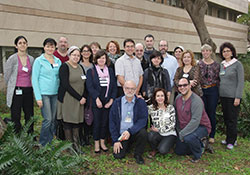Expansion of molecular diagnostics in the WHO European Polio Laboratory Network

Central Virology Laboratory (CVL), Israel
WHO/Europe has offered support to all laboratories in the WHO European Polio Laboratory Network to increase their poliovirus diagnostic capacities by upgrading to poliovirus intratypic differentiation (ITD). As a first step towards ITD implementation, WHO/Europe organized a hands-on workshop on 23–26 January 2017 in Tel Hashomer, Israel, for 11 virologists from WHO-accredited national polio labs in Albania, Belarus, France, Ireland, Israel, Spain, Sweden, Ukraine and the United Kingdom.
All virologists who attend this initial training and successfully pass a proficiency test will be able to differentiate between wild, vaccine and vaccine-derived polioviruses in their own laboratories. This initiative should decrease the number of samples undergoing transborder shipment, ensure quicker sample-to-result turnaround, and provide a foundation for poliovirus direct detection and characterization in clinical samples in the future.
ITD implementation does not require additional installation of equipment as it relies on the instrumentation already available in the laboratories. WHO commits to providing this initial platform-specific training to all labs in the Network, and to providing access to WHO polymerase chain reaction (PCR) ITD kits, annual proficiency tests and subsequent troubleshooting.
All 11 trainees in the first workshop successfully completed the necessary practical exercises and were awarded certificates of completion.
Sustaining polio-free status in the WHO European Region
The Region was declared polio free in 2002. To sustain this status, it is essential that every country in the Region maintain not only high immunization coverage at every administrative level, but also high-quality surveillance to ensure that any imported or vaccine-derived poliovirus is quickly detected. WHO/Europe coordinates the European Polio Laboratory Network to ensure a high standard of laboratory services in the Region. It supports Network laboratories through training to help them acquire necessary knowledge, methods and skills and by regularly assessing and facilitating improvement in the quality of their work.



